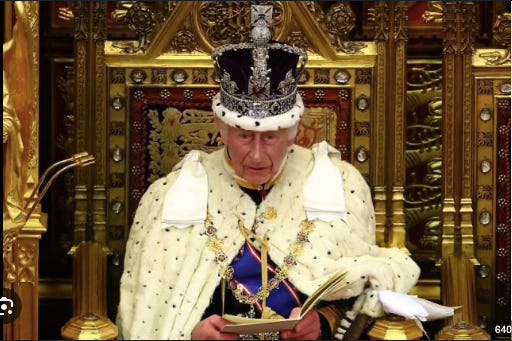The UK government has a bad habit of ratifying UN conventions but not incorporating them into domestic law. Here are two examples:
1. The UK ratified the International Covenant on Civil and Political Rights (ICCPR) in 1976 but in spite of repeated severe criticism from the UN Human Rights Committee, has failed to make it a part of domestic law.
The ICCPR says that every country, including Scotland, has a right to choose its own form of government and to control its own economy. It also says that “Direct Democracy” (DD), which includes the right of the people to launch initiatives and referendums, is as valid as English parliamentary democracy. The ICCPR does NOT, however, recognise or refer to constitutional monarchies - or monarchy, because both are English feudal concepts of sovereignty where the people are subjects, not citizens.
After the archaic spectacle of an elderly ermine-clad and bejeweled monarch intoning the government’s legislative programme, it’s unsurprising the UK hasn’t incorporated the ICCPR into domestic law. If it did, at a minimum, it would have to abolish the feudal monarchy and unelected House of Lords, and institute proportional representation.
2. The UK ratified the United Nations Convention on the Rights of the Child (UNCRC) in 1991. UNCRC sets out the rights every child has, but like the ICCPR, the UK failed to bring this into domestic law.
However, on December 7th, 2023, Holyrood unanimously passed the UNCRC (Incorporation) (Scotland) Bill. The UK government challenged four provisions of the Bill claiming they were outwith the legislative competence of the Scottish Parliament, highlighting the limits of devolution and also Westminster’s fear that the Bill would force it to protect childrens’ rights, such as the right to not live in poverty.
The Scottish Administration made the requested changes, the Bill unanimously passed again and its provisions came into force on July 16th, making it part of Scots Law. Scottish public authorities must now protect the rights of children and young people in their policies and decision making.
If Holyrood can legislate for the UNCRC, then they should also be able to legislate for the ICCPR. Giving the Scottish People the right to accept or refuse proposed devolved legislation via a Referendum and to write a new Constitution or propose constitutional amendments via an Initiative, breathes life into Popular Sovereignty, acknowledged both by Holyrood and Westminster as the basis of the Scottish constitution.
When Westminster objects, Holyrood should still pass legislation because royal assent is an English concept and doesn’t apply to Scotland where the People are sovereign. Failure to incorporate political rights into Scots Law renders Popular Sovereignty meaningless.
The new English Labour government has already challenged the rights of Scotland’s children by refusing to lift the two-child benefit cap, supported by all 37 of Scotland’s Labour MPs. Introducing political rights into Scots Law and allowing the People to exercise them will a) demonstrate to the People that popular sovereignty is more than a sound bite - it has real teeth, and b) provide them with the means to finally end this failing union.






Very interesting thanks. Looks like certainly some work needs to started on this and pronto.
The fact that the EngGBUKBrit governements have made sure these rights via the ICCPR have not been included into 'UK' law speaks volumes. Imagine their UK with no monarchy, no HOL's and with PR, it just wouldn't do would it, democracy is to be kept at a minimum at best in the so called UK.
Scotland needs to escape before it's too late. :-/
Good points again Leah. I am keen to develop the idea of a Respect Scottish Sovereignty (RSS) group which will work continueously to promote the Rights of the Scottish People and to ensure that Scottish People can democraticaly use their own traditional and international rights and not Have them denied by MPs in Westminster. If people would like to join the group contact me at andy@mail.scot